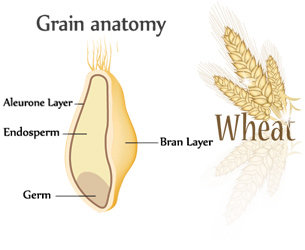- Fruits & Vegetables
- GMOs & Organics?
- Benefits of Grains
- What's a Carb?
- Low Carb Substitutes
- Proteins: Building Blocks
- Protein-Packed Breakfasts
- Meats: Keep it Lean
- Dairy Health Benefits
- Importance of Vitamin D
- Artificial Sweeteners
- Eating a Healthy Diet
- Fiber Sources & Benefits
- How Much Water?
- Example 2 Day Meal Plan
- Mediterranean Diet Pyramid
- Nutrition Facts Label
- Vitamins & Minerals
- U.S. Dietary Guidelines
benefits of whole grains
One of the main sources of carbohydrates is grains. Any food made from wheat, rice, oats, cornmeal, barley or another cereal grain fits into this food group.

However, you'll quickly see that when these grains are heavily processed, they lose much of their nutrition quality. Basically, the milling process removes the outer bran layer, where much of the fiber is found, and may also remove the center of the kernel, known as the germ. This is where a lot of the vitamins and protein are found. This makes the flour very light and fluffy, but nutrient-poor.
Enriched white bread uses refined wheat flour, but has many nutrients added back in. One hundred percent whole wheat flour, on the other hand, has been harvested and processed to include the whole grain, which makes a denser flour and a nutty-flavored bread with all the naturally occurring minerals such as iron, B-vitamins, vitamin E and calcium.
Whole Grains:
|
Refined grains include:
|
Learn more about unrefined and refined grains.
make at least half your grains whole grain
Most Americans have no problem consuming enough carbohydrates from grains. However, they're mostly refined varieties, which lack nutrient density. The Dietary Guidelines recommend making at least half your choices whole grains.
Choosing oatmeal, unsweetened cereal or corn tortillas for breakfast, as well as whole-wheat bread, brown rice and wheat pasta as staples in your diet make this easy to accomplish. Some enriched grains are better than others too; for example, some breakfast cereals may contain a rich supply of added vitamins and minerals where some refined snack foods do not. See whole grain products.
benefits of whole grain
- Reduced risk of chronic diseases such as obesity, heart disease, colon cancer, stroke and diabetes
- High folic acid content helps prevent neural tube defects
- Rich source of fiber supports healthy cholesterol levels and keeps the intestine running smoothly, which helps to prevent constipation and diverticulitis. Learn more about the benefits of fiber.
- Helps provide a feeling of fullness with fewer calories and a slower rise in blood sugar
- Naturally high in vitamins and minerals such as riboflavin, thiamin, niacin, folate, iron, selenium and magnesium